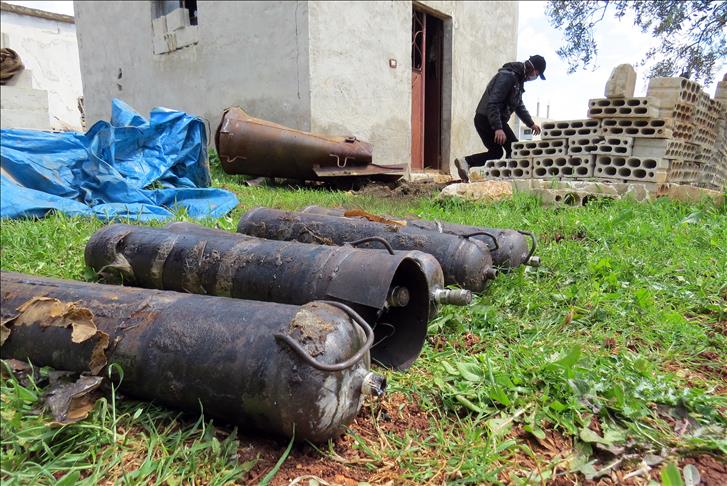
NEW YORK
The Syrian regime renewed its use of toxic chemicals in several barrel bomb attacks in the northwestern province of Idlib in the past two months, Human Rights Watch said Wednesday.
The New York-based organization urged the UN Security Council to immediately create a mechanism to identify responsibility for the use of such illegal weapons.
“While Security Council members deliberate over next steps at a snail’s pace, toxic chemicals are raining down on civilians in Syria,” said Philippe Bolopion, UN and crisis advocacy director for the group.
“The Security Council should firmly establish responsibility and impose sanctions for these attacks, which defy its resolution and violate international law,” he added.
The 15-member Council is scheduled to meet behind closed doors Wednesday for its regular monthly briefing on chemical weapons in Syria.
The rights group said it conducted inquiries with experts, rescue workers and doctors about three separate attacks in May in Idlib, which indicated the use of chlorine by Syrian President Bashar al-Assad’s regime forces that resulted in two deaths and 127 injuries.
Two doctors who treated victims in the May attacks also provided the group with data they collected from medical centers in Idlib on 21 additional attacks between March 16 and May 19 that resulted in symptoms consistent with exposure to toxic chemicals.
They reported that the 24 attacks during this period killed at least nine people and affected more than 520 others with symptoms consistent with exposure to chlorine, the group said.
"Human Rights Watch has not yet been able to investigate the additional reported attacks," it added.
The use of chlorine as a weapon in Syria has been previously documented.
A fact-finding mission by the Organization for the Prohibition of Chemical Weapons found in September 2014 “with a high degree of confidence, that chlorine was used as a weapon systematically and repeatedly in three villages in northern Syria.”
During the past several months, Syrian NGOs reported hundreds of deaths caused by the regime's barrel bomb attacks across the country.
Barrel bombs are improvised containers typically packed with shrapnel and explosives. Their rudimentary nature means they are unguided and are believed to have killed thousands of Syrians.
Human Rights Watch said the Chemical Weapons Convention, which Syria acceded to in October 2013, prohibits attacks that use an industrial chemical as a weapon and requires each member country agrees never to “assist, encourage or induce, in any way, anyone to engage in any activity prohibited to a state party under this convention.
"The laws of war applicable in Syria prohibit the use of chemical weapons. The use of prohibited weapons with criminal intent, that is deliberately or recklessly, is a war crime," it said.
In March, the UN Security Council adopted a resolution in which it voiced concern that toxic chemicals had been used as a weapon in Syria and threatened to slap sanctions against any party using them in Syria.
“The Syrian government has used barrel bombs with toxic chemicals for more than a year while the Security Council has failed to act,” Bolopion said.
“If Security Council members still have doubts about who is to blame for these attacks, they should immediately create a mechanism to identify responsibility for these attacks so they can start discussing how to hold them accountable," he added.
Syria has been gripped by constant fighting since the Assad regime launched a violent crackdown in response to anti-government protests in March 2011, triggering a conflict that has killed more than 220,000.
Anadolu Agency website contains only a portion of the news stories offered to subscribers in the AA News Broadcasting System (HAS), and in summarized form. Please contact us for subscription options.

